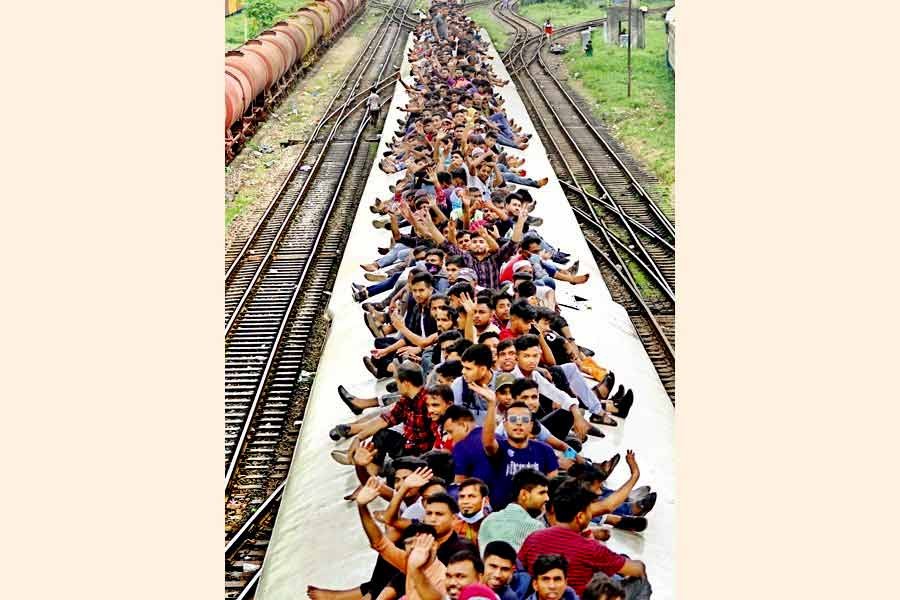
Published :
Updated :

On the eve of every Eid festival, newspapers almost routinely publish pictures of overcrowded trains. Sardine-packed trains also carry thousands of passengers on their roofs. The danger of making such journeys does not need any elaboration. No agency, not even the Bangladesh Railway, has tried seriously to stop passengers from taking such risks. So, people have been climbing to the roofs of trains and making hazardous journeys with no resistance. In such a situation, the country's higher court has stepped in. A High Court (HC) bench late last week directed the BR to stop passengers from climbing on the roofs of trains to make journeys. It also warned the relevant authorities of facing stern actions if anything unusual happened because of their failure to stop people from making train roof-top-journeys.
Stopping people from climbing on the roofs of any mode of moving transport, be it a train or a bus or a launch, by agencies responsible has been long overdue. Unfortunately, they, deliberately or otherwise, overlook the issue. It could be because the roof-top journeys take place only on the eve of two major religious festivals of the Muslims. But such travelling being patently unsafe, and illegal too, the law demands that the relevant agencies make a move to stop people from making such journeys altogether. Instilling personal sense of danger coupled with habit creation through enforcement should work. There is no denying that the rush of passengers on the eve of major festivals is enormous, and managing the same turns out to be very difficult. The mismatch between demand for, and, supply of, tickets in all modes of transport, particularly, that of trains, makes things truly difficult for the BR. The alleged black marketing of train tickets adds to the miseries of people wanting to go to village homes to celebrate the Eid festivals.
Given the situation prevailing on the ground, it remains to be seen how the BR can stop people from climbing the roofs of the train to make risky journeys in compliance with the HC directive. The BR will have to engage enough railway police personnel to do the job. But, while complying with the HC directive, the railway authorities will have to find a durable and effective solution to the problem people have been facing year after year during major religious festivals and other important occasions. Homebound passengers are forced to make roof-top journeys when they cannot secure train tickets from counters. Thus, what seems important to BR is raising its passenger-carrying capacity on important occasions. It needs to press enough special passenger trains into service to cope with the huge onrush of passengers.
It needs to be noted here that HC, on occasions earlier, had issued in Suo Moto directives or in Public Interest Litigation (PIL) suits. The removal of battery-run rickshaws from the streets is a case in point. In most cases, the relevant authorities are seen making some initial moves in compliance with the HC directives. But things usually return to the old state as they refrain from taking necessary steps. This should not be the case. Every agency, public or private, must faithfully carry out the orders/ directives of the country's higher court. Any failure on this account does only undermine its public image.


 For all latest news, follow The Financial Express Google News channel.
For all latest news, follow The Financial Express Google News channel.